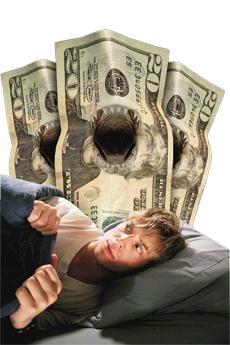One-third of Americans are losing sleep over the state of the U.S. economy and other personal financial concerns, according to a recent poll released by the National Sleep Foundation.
NSF conducted a poll called Sleep in America as part of its 12th annual National Sleep Awareness Week campaign, held March 1 to 8. The poll suggests that inadequate sleep is associated with unhealthy lifestyles and that not getting enough sleep has detrimental effects on health and safety.
According to the poll, about one-third of Americans experience mood difficulties that affect their sleep and health. They say they are worried, tense or anxious, unable to control the important things in their lives, or depressed at least a few days a week in the last month.
“”We found that the stress of personal finances was the main factor in what is disturbing people’s sleep,”” said Darrel Drobnich, NSF chief program officer.
Sleeping has an effect on every thing you do, including working well and efficiently, exercising, eating healthy, having sex or engaging in leisurely activities, Drobnich said.
“”We’ve definitely seen an increasing number of students feeling financial stress,”” said Glenn Matchett-Morris, a psychologist at the UA’s Counseling and Psychological Services. “”Anxiety or stress shows up in a number of ways – lack of sleep is definitely one of them.””
According to the poll, two out of every 10 Americans sleep less than six hours a night.
“”Sleep loss can lead to depression, stroke, heart disease, car crashes,”” Drobnich said. “”Also, we found that people who don’t sleep enough don’t exercise and they eat unhealthy, which leads to obesity.””
Seventy million Americans currently suffer from some kind of sleep disorder, according to the National Institute of Health.
Lack of sleep is not only dangerous to one’s health, it is also a public safety risk. According to the poll, more than half of adults indicated they had driven drowsy at least once in the past year, and more than a quarter of respondents said they had nodded off or fallen asleep while driving.
“”The average student is not getting enough sleep,”” said Leeann Hamilton, assistant director of health and preventive services. “”The economy has definitely had an effect on everyone. Some people lose sleep, some people just go into denial – everyone handles it differently. Sleep and health are very closely intertwined; it’s becoming more of a recognizable issue with people – especially in society. The reality is, you do need sleep.””
Getting enough sleep is important to manage stress, boost your immune system and it enhances overall emotional and physical health, Hamilton said.
While 64 percent of Americans report experiencing sleep problems at least a few nights a week within the past month, only 32 percent of all adults have ever discussed their sleep patterns with a healthcare professional, according to the poll.
If students are having difficulty sleeping, they are urged to talk to a professional. CAPS offers counseling with experienced professionals to provide treatment and help students cope with their personal issues, Matchett-Morris said.
“”Sleep is very important to your functioning, your driving, your moods,”” Hamilton said. “”We all would be a lot better off if we got more sleep.””
28%
The number of people who report getting eight hours of sleep on a regular basis today, a decrease from 38 percent in 2001
6.9
Average hours of sleep Americans get on weeknights
10
Average hours of sleep Americans got before Thomas Edison’s invention of the light bulb
$100,000,000,000
Estimated annual cost to Americans of sleep deprivation and sleep disorders, including lost productivity, medical expenses, sick leave, and property and environmental damage
source: National Sleep Foundation









